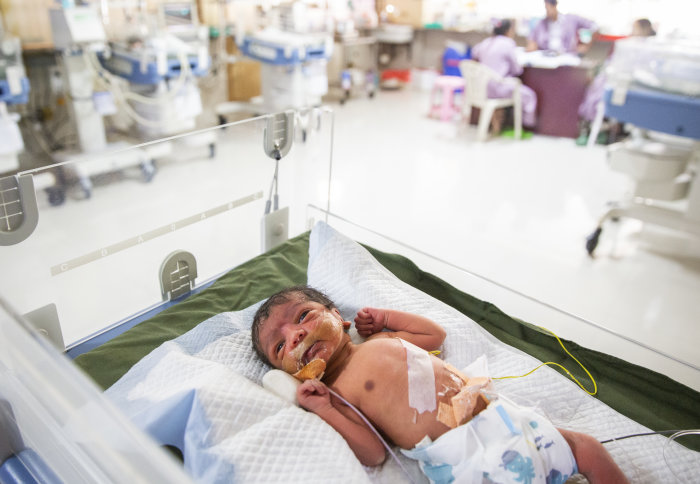World’s largest study on babies with brain injuries starts in India

The world’s largest study on babies with brain injuries will start in India this week to help prevent epilepsy.
Brain injury during labour or childbirth is one of the leading causes of epilepsy in babies in some areas of the world. A common cause is perinatal asphyxia – where oxygen is cut off to the foetal brain, damaging it.
Imperial College London will lead the Prevention of Epilepsy by reducing Neonatal Encephalopathy (PREVENT) study – to try and reduce the number of epilepsy cases following perinatal brain injury.

Worldwide approximately 50-70 million people have epilepsy, with around 12 million people were estimated to be living with epilepsy in India.
Approximately 500,000 new epilepsy cases occur in India every year, of which 87,000 (17.4%) are likely to be related to a birth related brain injury.
The vast majority of these cases will have additional neurodisabilities including cerebral palsy, deafness and blindness.

Researchers from Imperial, and other institutions in the UK and India will study around 60,000 women recruited from two major hospitals in South India – Bangalore Medical College and Calicut Medical College.
All babies with brain injury will have detailed neurophysiological investigations including electroencephalogram (EEG), advanced magnetic resonance imaging (MRI) and neurodevelopmental follow up assessments.
The £3.4 million study, funded by the National Institute for Health Research, will be conducted over four years.
The scientists hope that the findings from this trial will be applicable to babies in the UK and around the world as well as in India.
Care bundles

The researchers believe that perinatal brain injury could be reduced by introducing a ‘care bundle’ to improve the intra-partum care in Indian public hospitals, which includes intelligent foetal heart rate monitoring, an e-partogram, brain oriented neonatal resuscitation, and birth companions.
Imperial’s Dr Sudhin Thayyil, chief investigator for the project, said: “Birth asphyxia related brain injury is the commonest cause of death and disability in babies worldwide.
“We believe that this could be substantially reduced with a ‘care bundle’ that combines many key evidence-based elements which have been shown to reduce perinatal brain injury.
“Preventing birth related injury in babies is complex and requires innovative and collaborative approaches, as in the PREVENT study.”

Professor Helen Cross, from University College London and one of the study investigators, said: “Millions of people around the world develop epilepsy every year and the incidence is twice as high in low and middle income countries.
“Epilepsy related to perinatal brain injury is a large social and economic burden in India.”
"This study highlights how the best minds from India and the UK can come together to solve some of the biggest challenges." Mr. Oliver Ballhatchet British Deputy High Commissioner
Mr. Oliver Ballhatchet, British Deputy High Commissioner said, “I’m delighted that this collaborative study between UK and Indian universities in the field of medicine is being announced here in Chennai.
"India and the UK lead the world on medical research – India hosts numerous centres of excellence in world-class healthcare and research, and the UK’s university sector is ranked number one in the world in research citations.

"Our two countries are natural partners in healthcare and this study highlights how the best minds from India and the UK can come together to solve some of the biggest challenges.”
A number of leading academics in Obstetrics, Midwifery, Neonatology, Neurology, Electrophysiology, Public Health and Health Economics from the UK and India are involved in the PREVENT study.
Article supporters
Article text (excluding photos or graphics) © Imperial College London.
Photos and graphics subject to third party copyright used with permission or © Imperial College London.
Reporter
Stephen Johns
Communications Division